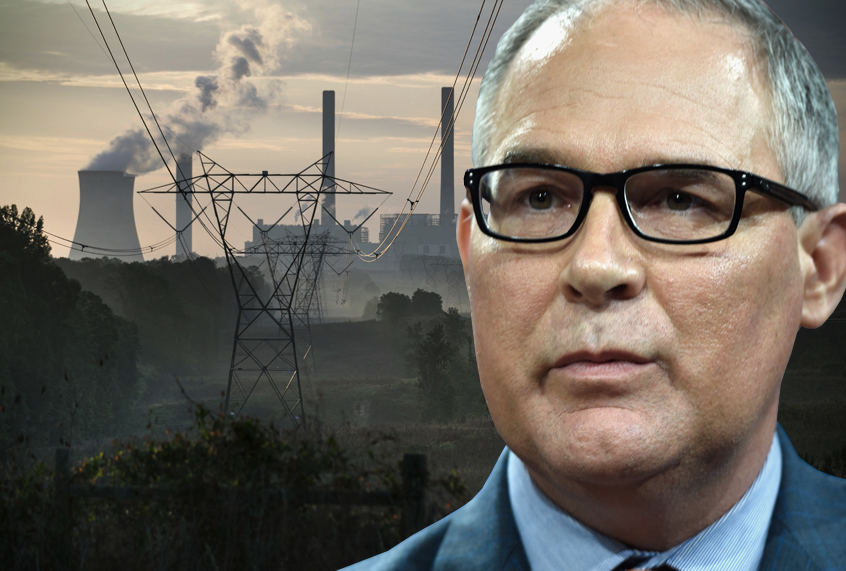As expected, Donald Trump’s EPA head, Scott Pruitt, signed off Tuesday on an effort to end a signature achievement of the Obama-era EPA, the Clean Power Plan. It would require power plants across the country to reduce emissions by 32 percent by 2030. Pruitt’s ostensible reason for this attempted rollback is that the Clean Power Plan was not crafted “carefully, properly, and with humility,” but he hasn’t taken any great pains to hide the real reason he opposes it: The plan encourages states to shift away from coal and towards natural gas or renewable resources to generate electricity.
“The war against coal is over,” Pruitt announced with great fanfare at an event with coal miners in Hazard, Kentucky, on Monday. “No better place to make that announcement than Hazard, Kentucky.”
This is a simplistic narrative that Trump and his administration have been pushing since the campaign days, pitting the supposed economic necessity of coal versus the supposedly elitist desire for clean air pushed by liberals. It’s a narrative that plays on the assumption that environmentalism is always in tension with economic well-being. It’s also a big wad of nonsense.
“Continuing to prop up the coal industry is bad for the economy, just as it’s bad for the environment,” Michael Brune, the executive director of the Sierra Club, told Salon.
As Brune explained, the Sierra Club has invested immense resources — 160 of its employees — in the task of monitoring the nation’s coal-burning power plants. What they’ve discovered, he said, is that coal plants are shutting down as other energy sources become “more accessible and more affordable.” Since 2010, in fact, almost half of the coal-burning plants in the country have either been retired or have a planned retirement date.
While political pressure has no doubt played a role, as David Roberts at Vox reported, economic pressures have almost certainly been the main engine driving the decline of coal. After all, the Clean Power Plan, while finalized under the Obama administration, has not yet been implemented. Trump and Pruitt’s efforts to pin the decline of coal on Obama are based on phantasms. The Clean Power Plan was only going to speed up an existing — and necessary — trend.
Nor is this really about jobs, as much as Trump and Pruitt would like voters to believe otherwise. The decline in coal jobs has been more than offset by the rise in cleaner energy jobs. If Trump was sincere about wanting people to have more jobs in energy industries, he’d be pushing for investments in clean energy and job training, not in these symbolic efforts to prop up the failing coal industry.
“What has been happening in the electric sector is a win-win-win,” Brune said. “We’re cutting air and water and climate pollution, we’re creating more jobs and, in most cases, we’re saving rate-payers money in the process.”
The inadequacy of the administration’s economic arguments is demonstrated by Pruitt’s actual plan to undermine the Clean Power Plan. A version of the proposal was leaked Monday. Pruitt’s case rests not on economic arguments but on trying to void the whole thing on technical grounds, arguing that the EPA lacks the legal authority to allow certain strategies the states are using to reduce emissions. (The quick version is that Pruitt argues that the EPA can only control what happens inside power plant fence lines, which would eliminate some of the creative strategies some states are using to get cleaner fuel or reduce demand in the first place.) It’s a version of the argument he used as Oklahoma attorney general, when he led a lawsuit against the EPA over the Clean Power Plan.
“Pruitt’s real objection has nothing to do with legal technicalities,” Roberts wrote in Vox. “He doesn’t want coal plants closing.”
While environmentalist and industry stakeholders have expected this decision for a long time, that doesn’t mean that the Clean Power Plan will be destroyed that easily.
“He’s going to have a tough job in the courts justifying any move to slow down or reverse what Obama put into place,” Brune said.
The biggest obstacle is that the Supreme Court ruled in 2007 that the EPA is required by law to regulate carbon emissions under the Clean Air Act. While climate change was not understood as a pressing issue when the Clean Air Act was passed, the court found that the law as written requires the regulation of any emissions deemed dangerous to human health and safety — and climate change is very much a threat to human health and safety.
“Leaked versions of Pruitt’s repeal proposal speak vaguely about asking for public input on a possible replacement plan, later, maybe,” David Doniger of the National Resource Defense Council wrote. “Whether it’s straight repeal or repeal-plus-do-nothing-replacement, the Trump/Pruitt Dirty Power Plan will not meet EPA’s obligations under the law.”
The fact that the energy industry is already on a path to reduce carbon emissions — especially from coal — gives environmental groups a strong argument that the Obama-era plan is a feasible way for the federal government to meet its legal obligation to protect our health and safety.
Ultimately, it seems that Pruitt’s fanatic zeal on this front is mostly driven by culture-war resentments. Coal isn’t economically or environmentally practical, especially over the long term. It’s yet another symbolic issue for the Trump administration: a way to stick it to latte-sipping liberals while also romanticizing an industry that has long been portrayed as employing hard-working rural white people.
The price being paid for this coal fetish is unbearably high. Just in the past couple of months, the country has been devastated by three hurricanes and a series of California wildfires, all of which were problems exacerbated by climate change. Apparently no amount of destruction will override Trump and Pruitt’s romantic fetish for coal.


